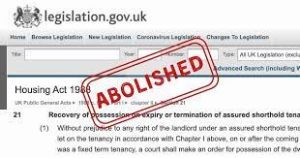
The recent announcement by the UK government to abolish Section 21 notices has sparked a heated debate among landlords and tenants alike. This controversial move is aimed at giving tenants more security and control over their living arrangements. However, many landlords argue that it will have unintended consequences, such as making it harder for them to evict problem tenants. In this blog post, we will explore the implications of this decision from a landlord’s perspective.
What is Section 21?
Section 21 of the Housing Act 1988 allows landlords in England and Wales to evict tenants without providing a reason. Landlords can issue a Section 21 notice to end a tenancy agreement after the fixed term has ended or during a periodic tenancy. This provides landlords with a straightforward and efficient way to regain possession of their property.
Why is Section 21 being abolished?
The government’s decision to abolish Section 21 notices is part of its wider efforts to reform the private rented sector. The aim is to improve tenants’ rights and provide them with greater security and stability. By removing the ability to evict tenants without a reason, the government hopes to discourage unfair evictions and improve the quality of rental housing.
What are the implications for landlords?
Many landlords are concerned that the abolishment of Section 21 notices will make it harder for them to evict problem tenants. They argue that this will lead to longer and more costly eviction processes, as landlords will need to provide valid grounds for eviction. This could result in landlords becoming more selective about who they rent to, which could make it harder for some tenants to find accommodation.
There are also concerns that the abolishment of Section 21 notices will lead to a rise in rent arrears and property damage. Without the threat of eviction, some tenants may be less motivated to pay their rent on time or take care of the property. This could result in financial losses for landlords and a decline in the quality of rental housing.
What are the alternatives?
While the abolishment of Section 21 notices may be a step in the right direction for tenants’ rights, it is important to consider the potential impact on landlords. There are alternative measures that could be implemented to improve tenants’ security and stability without disadvantaging landlords. For example, the government could introduce a system of mandatory mediation between landlords and tenants to resolve disputes. This could help to prevent unnecessary evictions and ensure that both parties are treated fairly.
Conclusion
The abolishment of Section 21 notices is a controversial decision that has divided opinion among landlords and tenants. While it is important to protect tenants’ rights and provide them with greater security and stability, it is also important to consider the impact on landlords. There are alternative measures that could be implemented to achieve the same goals without disadvantaging landlords. It remains to be seen how the government’s decision will play out in practice and whether it will achieve its intended aims.
